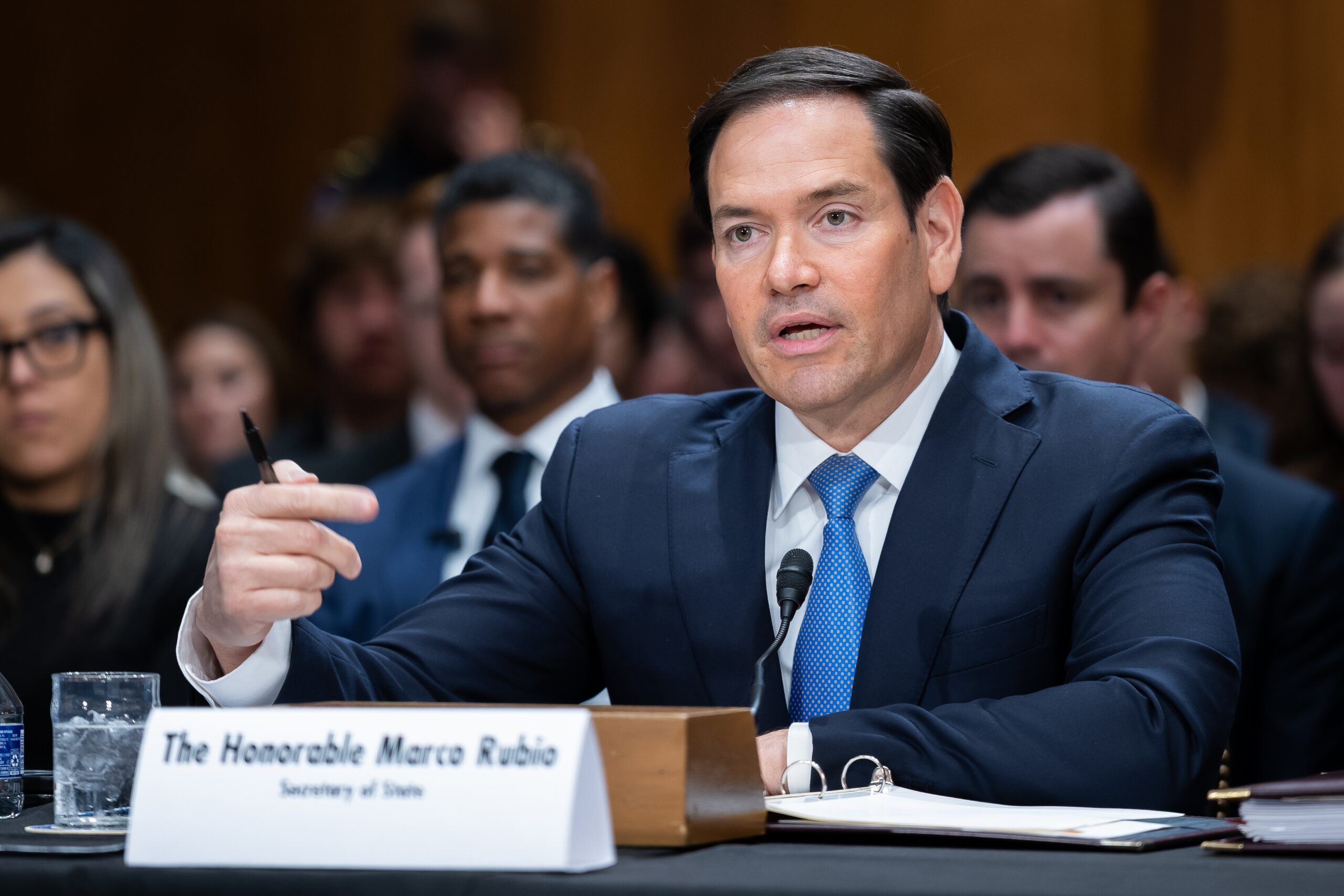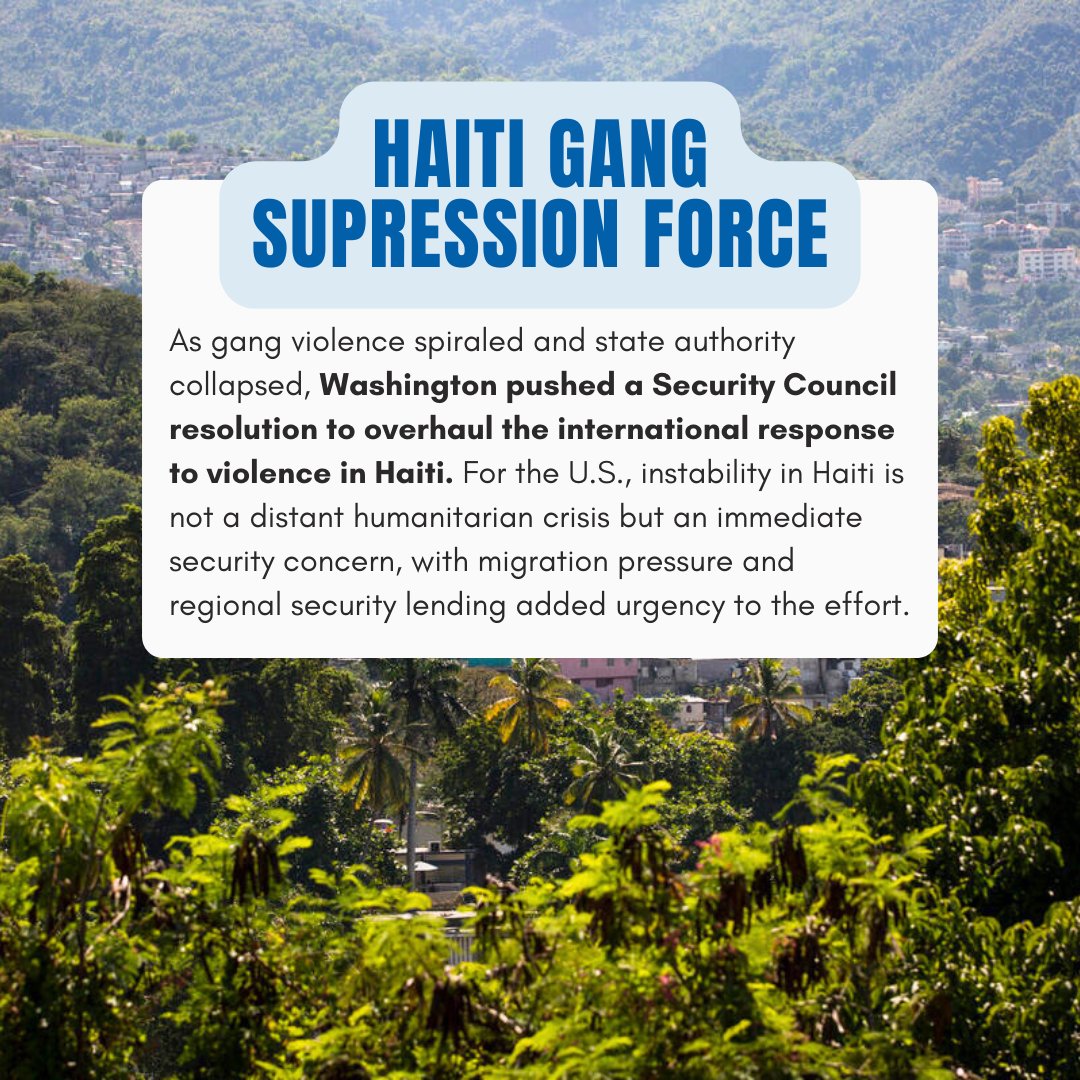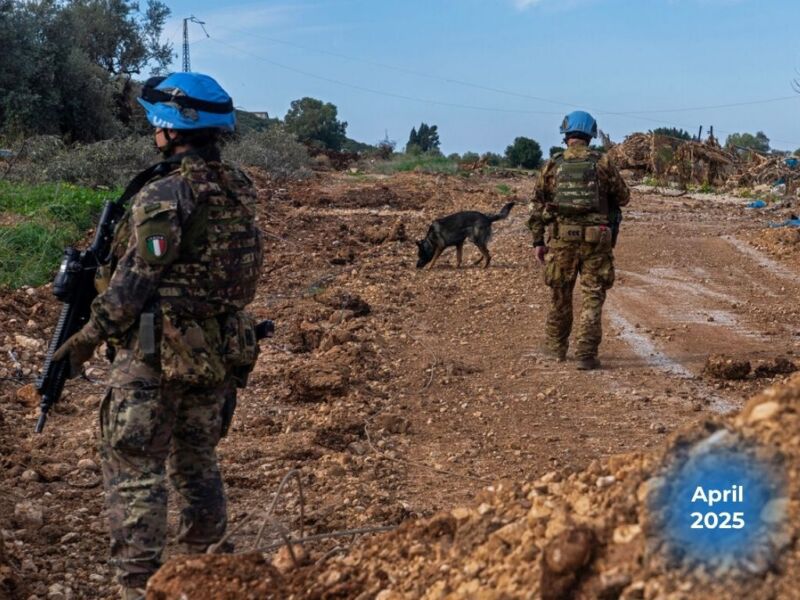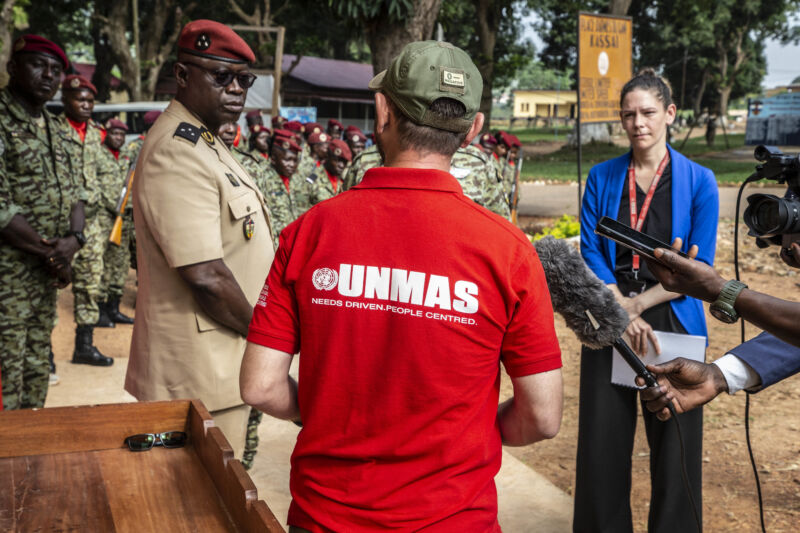Share
Array
(
[0] => WP_Post Object
(
[ID] => 16440
[post_author] => 5
[post_date] => 2025-12-29 20:55:14
[post_date_gmt] => 2025-12-29 20:55:14
[post_content] => As 2025 comes to a close, the United States’ $2 billion pledge for United Nations humanitarian assistance underscores America’s continued leadership at a moment of extraordinary global need.
Reached through the Trump Administration and the UN Office for the Coordination of Humanitarian Affairs (OCHA), the agreement pairs diplomatic engagement with expectations for improved effectiveness and accountability, while ensuring life-saving assistance continues to reach those most in need.
OCHA Chief Tom Fletcher welcomed the achievement, saying, “At a moment of immense global strain, the United States is demonstrating that it is a humanitarian superpower, offering hope to people who have lost everything.”
“At a moment of immense global strain, the United States is demonstrating that it is a humanitarian superpower, offering hope to people who have lost everything.”
Tom Fletcher, Under-Secretary-General for Humanitarian Affairs and Emergency Relief Coordinator, OCHA
At a joint press conference in Geneva to announce the measure, senior U.S. State Department official Jeremy Lewin said, “This is the U.S. and UN working together,” calling it “a first step in a very needed structural change that’s going to allow the UN to deliver on its incredible promise in a new and better way.”
“This is the U.S. and UN working together."
Jeremy Lewin, Under-Secretary for Foreign Assistance, Humanitarian Affairs and Religious Freedom
Speaking on CNN in an interview shortly after the press conference, Peter Yeo, President of the Better World Campaign, described the agreement as “an initial down payment" to U.S. partnership with the UN's in hotspots such as Yemen, Sudan and the Democratic Republic of the Congo.
[video width="640" height="360" mp4="https://betterworldcampaign.org/wp-content/uploads/2025/12/One-World-With-Zain-Asher-and-Bianna-Golodryga-U.S.-Cuts-Humanitarian-Aid-but-Hopes-for-More-Funding.mp4"][/video]
“The U.S. has long been the world’s most generous humanitarian donor, and we appreciate the Administration’s commitment to maintaining that leadership,” said Yeo.
That reality was acknowledged at the Geneva press conference. Lewin emphasized that the pledge should be understood as a starting point, not an endpoint.
“This $2 billion is not the end,” Lewin said. “It is an initial anchor commitment. We see this as a floor, not a ceiling – the beginning of what we hope will be a longer-term partnership.”
"We see this as a floor, not a ceiling – the beginning of what we hope will be a longer-term partnership.”
BWC also recognizes the role of U.S. Ambassador to the UN Michael Waltz in sustaining engagement with the UN, reinforcing U.S. participation in the mechanisms that shape how aid is delivered.
A Down Payment on Peace
Fletcher warns, however, that even with reforms, humanitarian actors are being forced to “hyper-prioritize” as needs outpace available resources. “We are understaffed and underfunded,” he said, describing a system under strain but capable of reform. “What really matters here is that millions of lives will be saved across 17 countries.”
This moment also highlights a broader strategic reality: humanitarian assistance does not operate in isolation. At the press conference, Lewin stressed that aid delivery must be linked to diplomacy and conflict resolution.
“Too often, we focus only on delivering aid,” he said. “But what ultimately reduces humanitarian need is peacemaking. The greatest humanitarian impact comes from ending conflicts.”
“What ultimately reduces humanitarian need is peacemaking. The greatest humanitarian impact comes from ending conflicts.”
“Humanitarian aid is a moral responsibility,” Yeo said in the CNN interview. "Ultimately it’s in America’s long-term interest.” Allowing humanitarian crises to go unaided, he warned, “poses downstream risks” to U.S. national security and to the safety of Americans.
That is why predictable and reliable support for assessed contributions, peacekeeping and other core UN functions remains central to effective humanitarian outcomes.
As it stands, the U.S. has not made regular budget payments for 2024 or 2025 and provided only 20% of its assessed peacekeeping payments.
As Fletcher noted in Geneva, “Nothing will do more to bring down the numbers of people in need than diplomacy and peacemaking,” supported by humanitarian systems that are efficient, accountable and properly resourced.
BWC welcomes the U.S. humanitarian pledge as a positive demonstration of American leadership and constructive engagement.
“This agreement moves us in the right direction,” Yeo said. “The next challenge is ensuring that the full UN system – humanitarian, peacekeeping and diplomatic – is resourced and aligned to meet the realities of today’s world.”
“The next challenge is ensuring that the full UN system – humanitarian, peacekeeping and diplomatic – is resourced and aligned to meet the realities of today’s world.”
Peter Yeo, President, Better World Campaign
[post_title] => U.S. $2 Billion UN Aid Pledge Marks New Era in Humanitarian Funding, Sustained UN Engagement
[post_excerpt] => America's new $2B humanitarian package to the UN showcases U.S. leadership and may redefine how lifesaving aid is delivered worldwide.
[post_status] => publish
[comment_status] => closed
[ping_status] => closed
[post_password] =>
[post_name] => us-2-billion-un-aid-pledge-marks-new-era-humanitarian-funding-sustained-un-engagement
[to_ping] =>
[pinged] =>
[post_modified] => 2025-12-29 21:45:35
[post_modified_gmt] => 2025-12-29 21:45:35
[post_content_filtered] =>
[post_parent] => 0
[guid] => https://betterworldcampaign.org/?p=16440
[menu_order] => 0
[post_type] => post
[post_mime_type] =>
[comment_count] => 0
[filter] => raw
)
[1] => WP_Post Object
(
[ID] => 16397
[post_author] => 5
[post_date] => 2025-12-23 19:54:08
[post_date_gmt] => 2025-12-23 19:54:08
[post_content] => As Washington debates U.S. authority on the high seas amid escalating maritime standoffs, the rise of ghost fleets is making headlines. Their spread has pushed the International Maritime Organization into the spotlight – and underscores why U.S. engagement in the very institutions that manage risk matters long before disputes spill into open conflict.
Also known as shadow ships or dark fleets, these vessels bypass maritime rules and international sanctions, most often tied to oil, though human trafficking and other illicit trade are close behind. Russia, Venezuela and Iran feature prominently in these operations, using regulatory gaps to operate in plain sight while avoiding accountability.
Here's how these dark vessels operate, why it matters to Americans and IMO's essential role at the center of the response.
Events unfolding in America’s backyard make clear that U.S. engagement in IMO is neither abstract nor symbolic; it helps determine whether disputes are managed through rules and coordination, or left to escalate.
Who Writes the Rules
Considered a technical agency of the United Nations, IMO is where global standards for maritime safety, security and pollution are negotiated and enforced. In 2023, IMO formally defined dark fleet practices, underscoring the growing risks posed by vessels that operate outside established norms.
Those definitions draw largely from the UN Convention on the Law of the Sea (UNCLOS), which sits within the UN Division for Ocean Affairs. Although a core principle of UNCLOS is freedom of the high seas (Article 87), that right is balanced by rules that require ships to meet safety and environmental standards, register under a national flag, continuously broadcast their precise location, carry insurance and more.
Where the system weakens is not in the rules themselves, but enforcement. That's because the UN principle of sovereignty leaves some of the finer points to individual states, like how fraudulent registrations are prosecuted. This creates space for less scrupulous actors to exploit loopholes.
It's important to note that the U.S. is among roughly two dozen countries that have not formally ratified UNCLOS, though Senate support is strong and U.S. naval operations and domestic maritime law largely align with its provisions. Ratification would strengthen U.S. legal standing to challenge ghost fleets and give Washington greater leverage to shape enforcement norms and close loopholes.
How Ghost Ships Disappear
There are a number of familiar tactics these nefarious fleets use to obscure their ownership, cargo, financing, routes and destinations.
First, many vessels turn off or manipulate their Automatic Identification System (AIS), the required tracking signal that broadcasts identity and location. When AIS goes dark, ships vanish from maritime maps. When manipulated, vessels can appear to be sailing legally in international waters while actually slipping into sovereign seas, conducting covert transfers or docking at sanctioned ports. For dark fleets, AIS manipulation is the difference between being monitored and being untouchable. "AIS spoofing," for example, was employed by a ship in the Caribbean during a high-profile case in December.
Another common tactic is flying under another nation’s flag, often through so-called "flags of convenience" (FOC). By international law, every ship must be registered to a country, what's known as its "flag state," which is legally responsible for enforcing safety, labor and environmental rules. Dark fleet operators exploit this system by registering vessels in countries with limited enforcement capacity or by frequently switching flags to blur accountability. In more extreme cases, ships engage in “false-flag behavior," deliberately misrepresenting their nationality or ownership – a serious violation of international norms designed to frustrate enforcement and shift blame away from the real operators.
Dark fleets also rely heavily on ship-to-ship transfers at sea to disguise cargo origins, a common practice by Russia. Instead of docking at port, oil, for example, is transferred between vessels in open water, usually while the AIS is disabled. By mixing cargo mid-ocean, ships can erase the paper trail of sanctioned oil before it ever reaches land. Beyond the obvious sanctions workarounds, these transfers also create significant safety risks, especially when conducted by older, poorly maintained tankers far from regulators.
To remain off authorities’ radar, most ghost ships avoid ports and inspections altogether. Ports are where vessels face paperwork checks, insurance verification and sanctions enforcement. Dark fleet vessels minimize port calls or rely on ports with weak oversight, allowing unsafe and illicit operations to continue unchecked for months or even years.
Finally, many ghost ships operate without insurance. Legitimate vessels carry coverage for oil spills, environmental damage and crew injuries. Ghost vessels often carry fraudulent certificates or no insurance at all. When accidents happen (spills, fires or collisions), there’s rarely an identifiable owner or financial backstop. That pushes clean-up costs onto coastal communities and taxpayers, turning illicit shipping into a public liability.
And if you think this crime is victimless, take the case of Ukraine. According to analysis from the Center for Strategic and International Studies, Russia’s war in Ukraine is now heavily financed through these very operations. Since late 2022, Moscow has assembled a vast shadow fleet transporting an estimated 3.7 million barrels of oil per day, generating up to $100 billion annually – revenue that rivals the total value of U.S. assistance to Ukraine.
How Do Ghost Fleets Impact Americans?
-
They weaken sanctions and prolong conflicts. If sanctioned oil can still move, sanctioned regimes can still get paid.
-
They make global trade less transparent and more expensive. Illicit shipping increases scrutiny and costs for legitimate operators.
-
They increase the risk of oil spills. Aging, poorly maintained vessels operate outside normal inspection regimes.
-
They shift cleanup costs to coastal communities. When ownership and insurance are opaque, local economies pay the price.
-
They create collision risks at sea. AIS manipulation produces dangerous blind spots in busy shipping lanes.
-
They enable organized crime. The same secrecy that moves oil can move drugs, weapons or trafficked people.
A U.S.-UN Issue
For more than half a century, the U.S. has helped lead the UN’s technical agencies, including IMO, where rules addressing global challenges like ghost fleets and sanctions accountability are set. In fact, America's own Coast Guard has been central to that effort, participating in "all policy development" since IMO's founding. In addition, advisors to IMO have hailed from the U.S. Department of State, Homeland Security, Defense, Justice, the Environmental Protection Agency, National Oceanic and Atmospheric Administration and National Transportation Safety Board. Much of what the world now considers international maritime law bears a distinctly American imprint.
That record is worth recalling as Congress weighs support for the UN. Events unfolding in America's own backyard make clear that U.S. engagement in institutions like IMO is neither abstract nor symbolic. It helps determine whether disputes are managed through rules and coordination, or left to escalate through miscalculation and force. It also ensures that adversaries who engage in practices like the use of dark fleets reap consequences not only from the U.S., but from the global community.
In an era of rising maritime risks, sustained U.S. leadership remains one of the most effective, least costly ways to protect American interests – without firing a shot.
In an era of rising maritime risks, sustained U.S. leadership remains one of the most effective, least costly ways to protect American interests – without firing a shot.
[post_title] => Ghost Ships on the High Seas and the Essential Role of the International Maritime Organization
[post_excerpt] => Dark fleets are quietly reshaping maritime security by evading sanctions, risking environmental disasters and underscoring why U.S. engagement at IMO and under UNCLOS still matters.
[post_status] => publish
[comment_status] => closed
[ping_status] => closed
[post_password] =>
[post_name] => what-are-ghost-ships-understanding-the-essential-role-of-imo
[to_ping] =>
[pinged] =>
[post_modified] => 2025-12-24 11:56:03
[post_modified_gmt] => 2025-12-24 11:56:03
[post_content_filtered] =>
[post_parent] => 0
[guid] => https://betterworldcampaign.org/?p=16397
[menu_order] => 0
[post_type] => post
[post_mime_type] =>
[comment_count] => 0
[filter] => raw
)
[2] => WP_Post Object
(
[ID] => 16376
[post_author] => 5
[post_date] => 2025-12-17 14:53:13
[post_date_gmt] => 2025-12-17 14:53:13
[post_content] => 2025 was a stress test for multilateralism. Engagement narrowed, budgets shrank and cooperation became more conditional. Even so, moments of real progress gave hope – reminders that the system still delivers when it matters most.
Here are nine moments from a memorable year.
1. Foreign Assistance Froze and USAID Ended.
Days into President Trump’s second term, U.S. foreign assistance was abruptly halted. While the fate of programs hung somewhere between speedy 90-day reviews and more comprehensive (still unreleased) multilateral aid reviews, USAID was busy shuttering its doors after 64 years at the forefront of lifesaving work. Funding pipelines dried up overnight, leaving partners and the people they serve in jeopardy.
A wave of executive actions soon followed. Global health and development programs were paused or cut. The Global Gag Rule returned. Even PEPFAR, long treated as politically sacrosanct, was dragged into domestic culture battles. The signal was clear: traditional development was out; transactional engagement was in.
2. Congress Cut the Foreign Affairs Budget.
If the Administration set the tone, Congress delivered the blow. A $9 billion rescissions package slashed U.S. funding for the UN and international organizations, zeroing out support for WHO and driving U.S. peacekeeping arrears past the $1.5 billion mark.
Proposals to cut peacekeeping by more than half and eliminate voluntary funding for agencies like the UN Development Programme (UNDP) and the Office of the High Commissioner of Human Rights (OHCHR) deepened the crisis. By late summer, a legally dubious round of pocket rescissions sought to claw back another $1 billion before the fiscal year ended.
The cuts left the UN cash-strapped, forcing plans for an austere 2026 budget and major staffing cuts. By year’s end, the 80th UN General Assembly convened under a cloud of fiscal crisis, raising fundamental questions about America’s role in the system it heavily supports – and relies on.
3. New Leadership Took the Helm of U.S. Foreign Policy.
Secretary of State Marco Rubio and U.S. Ambassador to the UN Mike Waltz stepped into office at a moment of retrenchment and rising global risk. Rubio brought a long-standing focus on China, migration and the Western Hemisphere into the role. Former Green Beret Waltz arrived with a security lens shaped by an emphasis on deterrence and burden-sharing.
Together, they’re reinforcing a results-driven approach to engagement – demanding more bottom-line outputs from institutions like the UN while remaining more than eager to use them when scale and legitimacy matter. Gaza and Haiti were early tests of that balance.
4. The UN Turned 80 – and Cut Budgets, Not Cake.
This year’s UN General Assembly felt more like triage than jubilation. Instead of marking the milestone with ceremony, Secretary-General António Guterres used the moment to brief Member States on UN80 – an ambitious reform effort launched earlier in the year to make the organization leaner and more effective.
Reform includes historic cuts to the core budget – 15 percent (about $577 million) in FY26 – and eliminates one in five posts through back-office consolidation. Separately, major peacekeeping troop drawdowns are already underway. Whether these reforms succeed hinges on political will.
As UN80 moves from blueprint to execution, the United States – long an advocate and architect of reform – will determine whether this moment delivers results or slips away.
5. Hostages were Released as Hope for Resolution – and Aid – Reached Gaza.
In November, Washington made one of the year’s most consequential diplomatic breakthroughs. Ending months of paralysis over the Israel-Hamas war, the UN Security Council adopted a U.S.-drafted resolution on Gaza. The measure passed 13-0, with Russia and China abstaining. This followed the release of Israeli hostages by Hamas and a fragile pause in fighting – briefly opening space for diplomacy to reassert itself.
The resolution embedded President Trump’s 20-point plan in a UN framework. It called for the resumption of humanitarian aid, authorizes a temporary international governing authority to oversee reconstruction and approves a multinational stabilization force as Israeli forces withdraw. The text also cautiously points toward a longer-term political horizon beyond the immediate crisis.
6. Syria’s Post-Assad Future Now Looks to International Support.
Syria’s political map shifted in 2025, opening a narrow but vital window. One year after Bashar al-Assad fled to Russia, a fragile transitional government under President Ahmad al-Sharaa – who delivered an historic speech to the UN General Assembly before visiting the White House – forced Washington to reassess whether sanctions designed for a fallen regime risked prolonging instability.
Congress is set to settle the question by repealing Caesar Act sanctions, clearing space for engagement and signaling that isolation risked ceding Syria to Iran and Russia. The UN emerged as the channel for cautious rebuilding, scaling aid, clearing landmines and laying early groundwork for reconstruction oversight as refugees weighed return.
Nevertheless, with costs exceeding $200 billion, the risks remain high.
7. Haiti Became a Proving Ground for a New Security Model.
As gang violence spiraled and state authority collapsed, Washington pushed a Security Council resolution to overhaul the international response to violence in Haiti, replacing a faltering mission with a UN-authorized Gang Suppression Force.
For the U.S., instability in Haiti is not a distant humanitarian crisis but an immediate security concern, with migration pressure and regional security lending added urgency to the effort.
8. Sudan Reached its Nadir
As attention fixed on Gaza and Ukraine, Sudan slipped into the world’s worst hunger crisis. Famine was declared across multiple regions, millions were displaced and humanitarian access collapsed amid fighting between rival generals. With funding drying up and donor focus drifting, the gap between needs and capacity widened daily.
For Washington, the crisis exposed the limits of restraint. Long Sudan’s largest humanitarian donor, the United States scaled back contributions amid a broader foreign-aid freeze, pairing diplomatic statements with little appetite for deeper engagement.
Sudan became one of 2025’s darkest lessons: without sustained political will and adequate funding, even the UN’s largest humanitarian machinery cannot keep pace.
9. “America First” was Codified.
December’s National Security Strategy formalized what 2025 had already revealed in practice.
The document rejected broad-based engagement in favor of a narrower definition of U.S. national interest. Prevention and long-term institution-building gave way to demands for immediate results tied directly to U.S. priorities. Agencies focused on migration management, sanctions enforcement, counter-narcotics and security cooperation rose in prominence, while those centered on human rights, development and governance receded.
Yet the NSS stopped short of rejecting multilateralism. In fact, Gaza and Haiti offered proof of the strategy’s internal tension: even as funding contracted and rhetoric hardened, Washington still turned to the UN when legitimacy and risk-sharing were indispensable.
Looking Ahead to 2026: An Inflection Point More Than a Reset
If 2025 marked a contraction in U.S.-UN relations, 2026 will test whether the relationship stabilizes or hardens.
New security missions move from mandate to reality, budget politics remain volatile and the United States will host the G20 even as it questions multilateralism. Even the World Cup is already taking on diplomatic weight, with visa restrictions and domestic tensions threatening to turn a global celebration into a political flashpoint.
Policy signals point toward a narrower, more transactional approach. Culture wars may further constrain cooperation, while Washington’s influence over the upcoming Secretary-General election is likely to favor managerial restraint over aspirational vision.
Operationally, 2026 will be unforgiving. Gaza and Haiti will test whether UN-authorized, burden-sharing security models can deliver results with U.S. financing and diplomacy rather than troops. Peacekeeping faces the same strain: doing less without leaving dangerous vacuums behind.
There will be no return to the multilateralism of the past.
The question is whether a leaner U.S.-UN relationship can still deliver when stakes are highest.
[post_title] => The U.S.-UN Relationship in 2025: 9 Memorable Moments
[post_excerpt] => 2025 was a defining year for multilateralism. As America First narrowed U.S. engagement and put the brakes on foreign assistance, nine moments stood out that shaped U.S.-UN relations heading into 2026.
[post_status] => publish
[comment_status] => closed
[ping_status] => closed
[post_password] =>
[post_name] => the-us-un-relationship-in-2025-9-moments-that-tell-the-story
[to_ping] =>
[pinged] =>
[post_modified] => 2025-12-18 01:33:22
[post_modified_gmt] => 2025-12-18 01:33:22
[post_content_filtered] =>
[post_parent] => 0
[guid] => https://betterworldcampaign.org/?p=16376
[menu_order] => 0
[post_type] => post
[post_mime_type] =>
[comment_count] => 0
[filter] => raw
)
[3] => WP_Post Object
(
[ID] => 16357
[post_author] => 5
[post_date] => 2025-12-12 22:16:11
[post_date_gmt] => 2025-12-12 22:16:11
[post_content] => The first Nor’easter of the season knocked out power shortly after my interview with Ko Barrett began. On a glitching screen beside a New Hampshire fireplace, I pleaded with my phone for a hotspot while Barrett – the deputy secretary-general of the United Nations’ World Meteorological Organization and the first American in its leadership – smiled. “I miss fireplaces,” she said disarmingly. “At home on my farm in North Carolina, we heat with a woodstove.”
I liked her instantly.
[caption id="attachment_16365" align="alignright" width="205"] Ko Barrett, Deputy Secretary-General of the World Meteorological Organization[/caption]
There I was, half-frozen and half-offline, while the woman responsible for safeguarding the planet’s weather data was reassuring me over a video call. It felt oddly appropriate.
Barrett’s résumé stretches across the modern climate world: two decades at the National Oceanic and Atmospheric Administration (NOAA), years representing the U.S. in international climate negotiations, vice-chair of the Intergovernmental Panel on Climate Change (IPCC) – the body whose work earned her and her colleagues a Nobel Peace Prize – and a fierce champion for women as she shattered glass ceilings on the climb. Now she oversees the global architecture of weather prediction – a system billions rely on every day. Barrett is a powerhouse.
So is that system – the World Meteorological Organization.
Most Americans have never heard of it. Yet WMO data helps determine if planes get off the ground and whether you reach for a raincoat on a Tuesday morning. “Reliable forecasts don’t happen by accident,” Barrett told me. “No country can know the world’s weather on their own.”
That’s where the value of WMO is unmatched – and U.S. collaboration makes all the difference.
Ko Barrett, Deputy Secretary-General of the World Meteorological Organization[/caption]
There I was, half-frozen and half-offline, while the woman responsible for safeguarding the planet’s weather data was reassuring me over a video call. It felt oddly appropriate.
Barrett’s résumé stretches across the modern climate world: two decades at the National Oceanic and Atmospheric Administration (NOAA), years representing the U.S. in international climate negotiations, vice-chair of the Intergovernmental Panel on Climate Change (IPCC) – the body whose work earned her and her colleagues a Nobel Peace Prize – and a fierce champion for women as she shattered glass ceilings on the climb. Now she oversees the global architecture of weather prediction – a system billions rely on every day. Barrett is a powerhouse.
So is that system – the World Meteorological Organization.
Most Americans have never heard of it. Yet WMO data helps determine if planes get off the ground and whether you reach for a raincoat on a Tuesday morning. “Reliable forecasts don’t happen by accident,” Barrett told me. “No country can know the world’s weather on their own.”
That’s where the value of WMO is unmatched – and U.S. collaboration makes all the difference.
“Reliable forecasts don’t happen by accident... No country can know the world’s weather on their own.”
[caption id="attachment_16361" align="aligncenter" width="1536"] Views from the top of Mount Washington (photo credit: Mount Washington Observatory)[/caption]
Views from the top of Mount Washington (photo credit: Mount Washington Observatory)[/caption]
From the World to Mount Washington
To understand just how intertwined America’s weather system is with the rest of the world, the highest peak in New England offers a vivid illustration. Atop the Mount Washington Observatory – where the weather is so feral that it once clocked the world’s fastest wind speed, a brutal 231 mph – a small team of scientists produces the forecast that generations of locals, hikers and search-and-rescue crews have relied on.
“When anyone heads into the White Mountains, they start with our data,” Drew Bush, PhD, the Observatory’s executive director, said. “The Forest Service, Fish and Game, the Appalachian Mountain Club – they all depend on it.”
“On the worst days,” he added, “they’re calling us by the minute asking for specifics.”
Their data is both hyperlocal and sweeping. It shapes maritime forecasts, guides aviation experts and hosted research to improve how the U.S military defrosts their aircraft. And when conditions allow, they even turn to studying cosmic rays from space.
From their supercomputers and laboratories, the Observatory’s readings go into NOAA’s systems, then on to WMO’s global exchange. One gust at the peak becomes part of the world’s hurricane models, flood maps and aviation alerts. “What we do locally matters to people nationally and internationally,” Bush said. “It’s all connected.”
“What we do locally matters to people nationally and internationally... It’s all connected.”
That’s the point. In fact, part of billions of datapoints. That happens in the Granite State – or any state – really does matter to the rest of the planet.
The entire network – stretching from the American northeast to the rest of the world – exists because nations decided, improbably, that it should.
The Origins of the Improbable
This improbable idea traces back to 1853, when naval officers from ten nations met to compare ship logs. The U.S. delegate marveled that so many navies would gather “not at the cannon’s mouth,” but for the “noble purpose of serving humanity.”
In 1873, meteorologists standardized observations across borders, laying the groundwork for what would become WMO. Even at the height of the Cold War, American and Soviet scientists worked through WMO to build the World Weather Watch, the backbone of modern forecasting. When political leaders weren’t speaking, scientists were.
When political leaders weren’t speaking, scientists were.
Today, WMO oversees the sprawling infrastructure they built. It founded the IPCC. It maintains the world’s official temperature, rainfall, wind and lightning records. It names the hurricanes. (And fun fact: an Australian meteorologist once named storms after politicians he disliked.) It curates the International Cloud Atlas, which may seem quaint until you remember those nimbi can make or break a harvest.
But the machinery behind all this is straining. WMO’s budget has been cut by a third. Weather stations in poorer countries struggle with outdated equipment. Sensors are destroyed in conflict zones. And the extremes Americans now endure – Arizona heat, Texas floods, Florida hurricanes – demand faster, sharper warnings.
"People increasingly experience climate through its extremes,” Barrett told me. “They need early warning. That starts with data.”
"People increasingly experience climate through its extremes... They need early warning. That starts with data.”
Bush put it in even starker terms: “The atmosphere doesn’t care about borders. If one piece of the system weakens, forecasts everywhere get worse.”
The Human Side of Leadership
For all her technical authority, Barrett carries the welcome ease of someone shaped by her native Appalachia. She describes spring as “the smell of a forest floor.” She once briefed world leaders with her dog, Finn, curled beside her. Her mix of precision and humility reminded me that the global weather system rests on very human shoulders – people with woodstoves and outages, farms and families, keeping a planet’s worth of storms at bay.
NASA climatologist Marshall Shepherd said it best: “The weather’s happening all around us… The systems that help us understand it are the scaffolding of modern life – invisible, until they break.”
It’s a perfect metaphor for the UN – and for WMO. Mostly unseen. Absolutely vital. Until it’s gone.
Here in New Hampshire, tending my own stove, I take comfort knowing Barrett is in Geneva tending the global machinery – and that Bush is on the summit sending down the next warning before the wind picks up. Between them, and thousands more, they’ll make sure tomorrow’s forecast arrives right on time. A small miracle of global cooperation to help us navigate the wintry roads ahead.
“The weather’s happening all around us… The systems that help us understand it are the scaffolding of modern life – invisible, until they break.”
[post_title] => A Fireside Chat with the Planet’s Top Weather Watchers: Getting to Know the World Meteorological Organization
[post_excerpt] => From nor’easters to mountaintop observatories, here’s how the UN’s World Meteorological Organization works with U.S. forecasters as an invisible force keeping Americans safer on this winter’s roads.
[post_status] => publish
[comment_status] => closed
[ping_status] => closed
[post_password] =>
[post_name] => get-to-know-the-world-meteorological-organization
[to_ping] =>
[pinged] =>
[post_modified] => 2025-12-14 22:17:52
[post_modified_gmt] => 2025-12-14 22:17:52
[post_content_filtered] =>
[post_parent] => 0
[guid] => https://betterworldcampaign.org/?p=16357
[menu_order] => 0
[post_type] => post
[post_mime_type] =>
[comment_count] => 0
[filter] => raw
)
)

Ghost Ships on the High Seas and the Essential Role of the International Maritime Organization

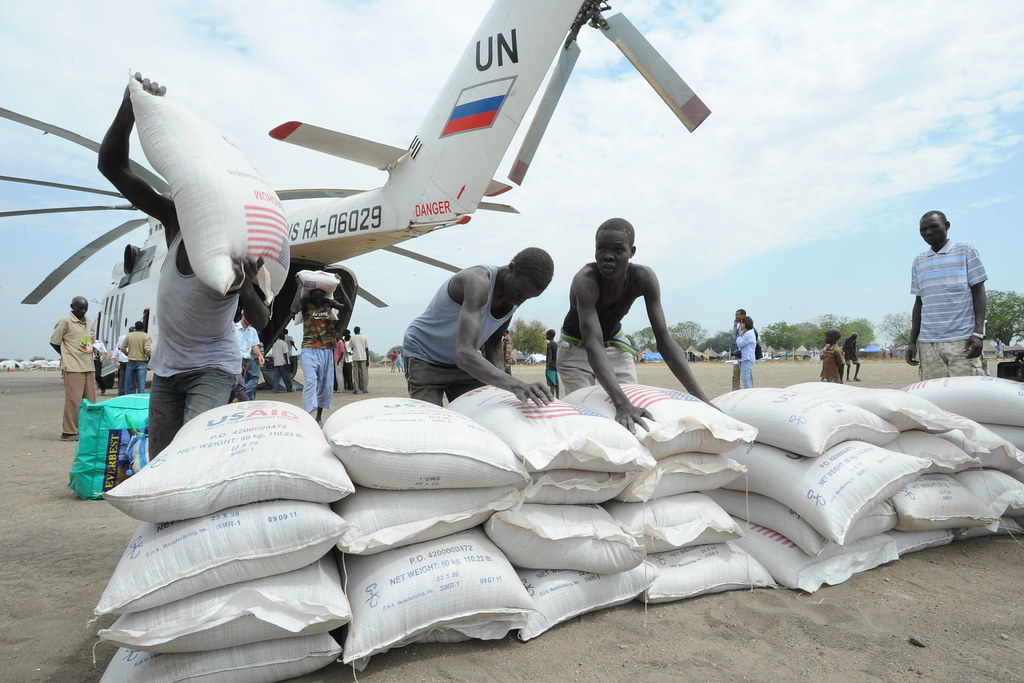
U.S. $2 Billion UN Aid Pledge Marks New Era in Humanitarian Funding, Sustained UN Engagement

Ghost Ships on the High Seas and the Essential Role of the International Maritime Organization


A Fireside Chat with the Planet’s Top Weather Watchers: Getting to Know the World Meteorological Organization
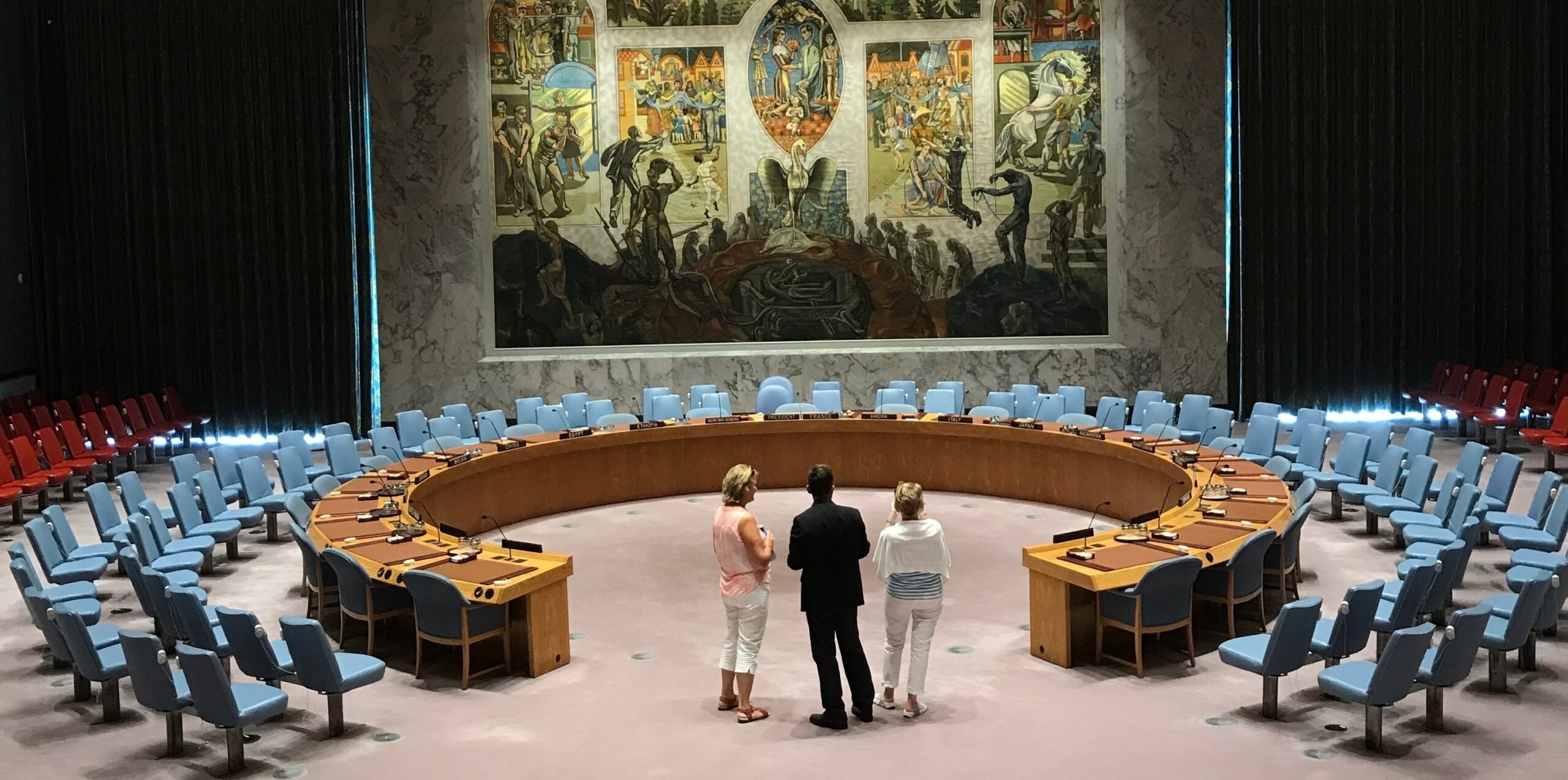

American Farmers Have Much to Gain from the United Nations

The UN Security Council Just Backed the U.S. Plan for Gaza – What It Means and What Comes Next
On the International Day of Epidemic Preparedness, catch up on an interview with BWC Executive Dir. of Global Health Advocacy @chrissocial2 and @WHO Director of Immunization, Vaccines and Biologicals @Kate_L_OBrien on the lifesaving power of prevention.

The Power of Prevention with WHO’s Dr. Kate O’Brien
Dr. Kate O’Brien, WHO Director of Immunization, speaks with BWC's Chris Moore about the essential role of WHO in protecting American health.
betterworldcampaign.org
Wishing you and yours a safe holiday season and a better, brighter world in 2026.
As families gather around the table to celebrate the holidays, here’s some food for thought: how America’s engagement at the @UN supports American farmers year-round.
Catch up on one of our most popular reads of the year:

What U.S. Farmers Get from America’s Engagement in the UN – and What We Lose When We Walk Away
Recent Executive Orders freezing foreign assistance are taking a multiple-billion-dollar toll on U.S. farmers. That’s ...
betterworldcampaign.org
As 2025 comes to a close, catch up on one of our most popular reads of the year: the history and impact of the @UN Security Council veto.
From its origins to why it matters today, learn how this unique power continues to shape diplomacy at the UN.

UN, Explained: The History of the United Nations Security Council Veto
The five permanent members of the UN Security Council have veto power. We explore the history of that exclusive privilege.
betterworldcampaign.org
🧵As 2025 comes to a close, we're looking back on the 9 memorable moments that shaped the U.S.-UN relationship.
@michaelgwaltz @USUN @USAmbUN
@michaelgwaltz @USUN @USAmbUN Check out the full list at the link below.

The U.S.-UN Relationship in 2025: 9 Memorable Moments
2025 was a defining year. As America First narrowed U.S. engagement, 9 moments stood out that shaped U.S.-UN relations heading into 2026.
betterworldcampaign.org
Peacekeeping recap 2025
In April, missions around the world marked the International Day for Mine Awareness and Assistance in #MineAction.
@UNMAS provides direct support & assistance to @UNISFA_1, @UN_CAR, @UN_CYPRUS, @MONUSCO, @UNIFIL_, @unmissmedia & #MINURSO.
#YearInReview
Partnerships between the @ITU and @USUN keep Americans connected and in the know.
Learn how this @UN agency makes global connectivity possible:

The U.S. Mission hosted ITU Secretary-General candidate Doreen Bogdan-Martin at a roundtable discussion with major U.S. private sector companies. Ms. Bogdan-Martin is the right leader to continue moving the ITU forward and strengthen global digital connectivity.
Behind every forecast is a global network at work.
From the Mount Washington Observatory (@mwobs) to the World Meteorological Organization (@WMO), local data feeds the global forecasts we rely on every day.
Learn more:
https://betterworldcampaign.org/expert-analysis/get-to-know-the-world-meteorological-organization
This week, the Trump Administration released its 2025 National Security Strategy.
💡Here's what it means for U.S. strategy and multilateralism:
What the 2025 National Security Strategy Means for Multilateralism
The 2025 National Security Strategy advances an "America First” approach with major implications for U.S. engagement with the United Nations.
betterworldcampaign.org
